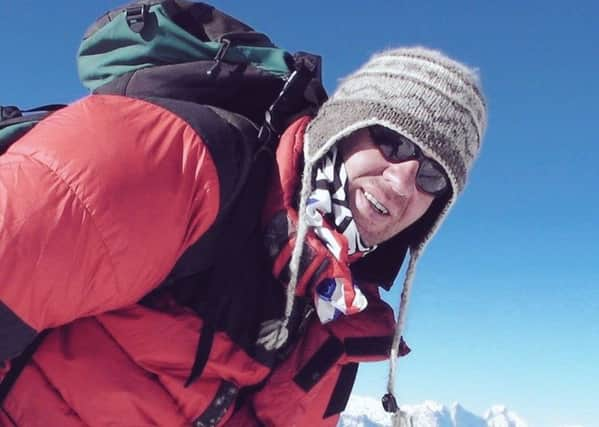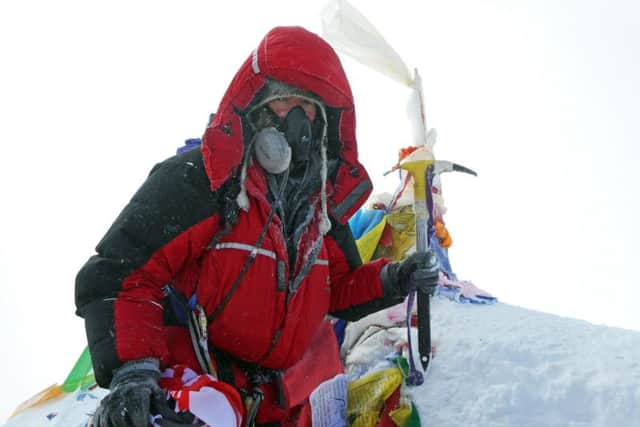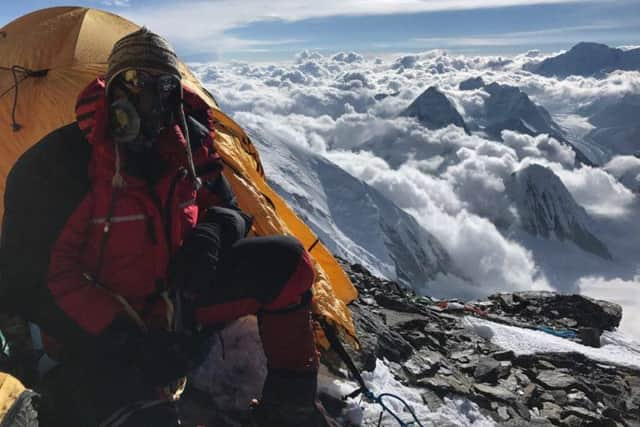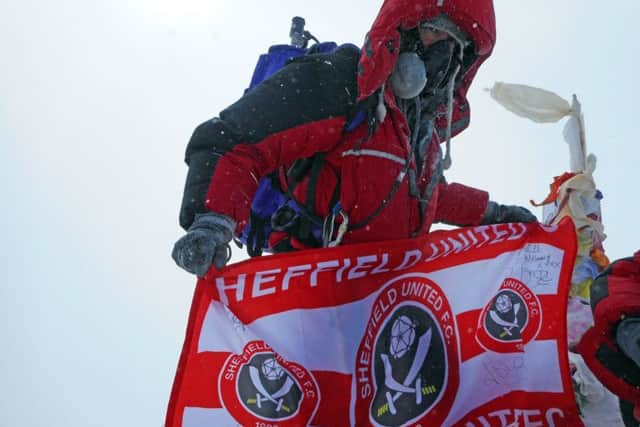Ian Toothill: Why cancer didnt' stop me conquering Everest


When Ian Toothill boarded a plane heading for Everest base camp, among the few luxuries in his backpack was a copy of Mountains of the Mind. Robert McFarlane’s bestselling book is a reflection on why apparently sane individuals risk life and limb climbing mountains. Should there ever be a new edition, Ian, who scaled the world’s highest peak after being told his bowel cancer had returned and he would likely not see another Christmas, could make a neat final chapter.
Initially diagnosed in 2015 he thought treatment had been successful. However, the following summer the disease returned and by the end of the year the 47 year old was told there was no further treatment available.
Advertisement
Hide AdAdvertisement
Hide Ad“The day before I was told the cancer had come back again I was walking back from the shops and, with carrier bags in my hand, I suddenly made a decision,” he says. “I thought, ‘Right, if the cancer is back I am going to climb Everest’. I have no idea where it came from, but for the first time in two years I felt a real sense of excitement.”


Ian wasn’t exactly a mountaineering novice. He had grown up walking the hills of the Peak District, near his family home on Sheffield’s Manor Estate, and already had a number of big climbs under his belt. However, Everest was a different proposition and one not everyone approved of.
“My GP was all for it, but one doctor was dead against it and another thought it was a bad idea but knew I was a complete idiot who was going to do it anyway. He was right.”
A qualified personal trainer, Ian began a programme of weight-training, but he was also self-aware enough to know that the mental challenge would be as great as the physical one.
Advertisement
Hide AdAdvertisement
Hide Ad“While you climb in a group, really you are alone as everyone sets off at slightly different times and every step you take you are on your own. I had taught myself some breathing exercises for when I was nervous, but before I went I also prepared three reasons why I had to get to the top.


“I had to complete it or Macmillan Cancer Support wouldn’t get the money raised and people suffering from cancer would lose out. My mum died four years ago and it would have been her birthday while I was out there so I wanted to do it for her. I also told myself, ‘Don’t think like a normal person, think like someone who has been given a chance at life and give it your all’.”
Those three mantras came in handy one morning when the weather, which had already been set against the climbers, turned even worse.
“At 5am I woke to find the tent on top of me. The poles had snapped and I was basically pinned underneath. It was pitch black, but eventually one of the other climbers managed to get me out. I sat on the tent for two hours hoping to save it, but it was no good. In the end it started to disintegrate and I just had to let it go.
Advertisement
Hide AdAdvertisement
Hide Ad“There is only a month or so every year when an ascent of Everest is possible and even then there are narrow windows to actually reach the the summit. This year was completely unpredictable. Quite a few people I had been at Base Camp with did jack it in. It was understandable. There wasn’t even a real window to do that final stretch but we went for it anyway. I had to.”


Back at the camp, Ian hastily replaced his lost kit with borrowed donations and tried to put thoughts of further disaster out of his mind. There was thankfully one giant distraction.
Climbing from the north ridge in Tibet, in the days leading up to Ian’s record-breaking achievement he glimpsed the top of the peak an hundred times a day and it was those images which kept him going even when his limbs ached, when a stomach bug forced him onto antibiotics and when hunger and exhaustion threatened to overcome him.
“No one who goes out to climb Everest for the first time really knows what to expect. And if I have a piece of advice to anyone thinking about it I would say, bring chocolate. Lots of chocolate. While the Sherpas do a great job, cooking is not their speciality and once you are climbing, freeze-dried ration packs get a bit monotonous.
Advertisement
Hide AdAdvertisement
Hide Ad“However, if you like Pringles and Snickers you’ll be ok, as they have pretty much cornered the market in Himalayan snacks. On the day of our final climb I think I ate 12 Snickers. I may never eat another one again.”


After reaching the summit, Ian, a Sheffield Wednesday fan, planted a flag of rival club Sheffield United to secure a £1,000 donation from a friend and tweeted: “Nothing to see here, just some cancer dude [Sheffield Wednesday] fan on the summit of Everest with a @SUFC flag.” It was perhaps a surprisingly modest reaction and even now back home in London he says it hasn’t quite sunk in.
“I was so paranoid about losing that flag that I’d put it in the secret pocket of my backpack. When my tent got destroyed the first thing I did was grab my bag. I couldn’t risk it going the same way.
“People talk about being able to see the curvature of the Earth but the weather wasn’t great so the horizon was obscured. I did what most people do, I got someone to take a few pictures of me and then took a few minutes to try and take it all in. Then I thought about my mum.”
Advertisement
Hide AdAdvertisement
Hide AdIan’s mother died four years ago, but the stories she told him as a child of how Edmund Hillary and Sherpa Tenzing had conquered the mountain in 1953 remained a constant source of inspiration.
“I was sat there on top of the world and then all of a sudden I just felt a rage building inside. It wasn’t against anyone, it was against the cancer and it felt like a complete release from everything that had gone before.”
After 10 or 15 minutes on the summit, Ian began his descent and, as he did, he had no idea of the response from back home.


“I can confirm that Everest has the poorest wifi in the world, so until I got back I didn’t really know what the reaction had been. People have said some nice things and the word inspiration has been bandied about, but I am just an ordinary bloke who happened to do something a bit out of the ordinary.
Advertisement
Hide AdAdvertisement
Hide Ad“It’s been a bit strange coming home. I was out in the Himalayas for 10 weeks and life is a lot simpler out there. For a while it was just me and the mountain and that felt pretty good.”
While an initially fundraising drive paid for the trip Ian has set a target of raising £250,000 for Macmillan Cancer Support. There is still a way to go and perhaps more than anyone, Ian knows that he only has limited time to achieve his dream.
“I deliberately haven’t opened the post yet. In two or three weeks I will have to go in for more scans to see what impact going up Everest has had on my body. I don’t know what the results will be, but I do know that whatever the results I will have no regrets. Absolutely none.”
To donate to Ian’s fundraising effort go to www.justgiving.com/fundraising/ClimbingEverestForCancer